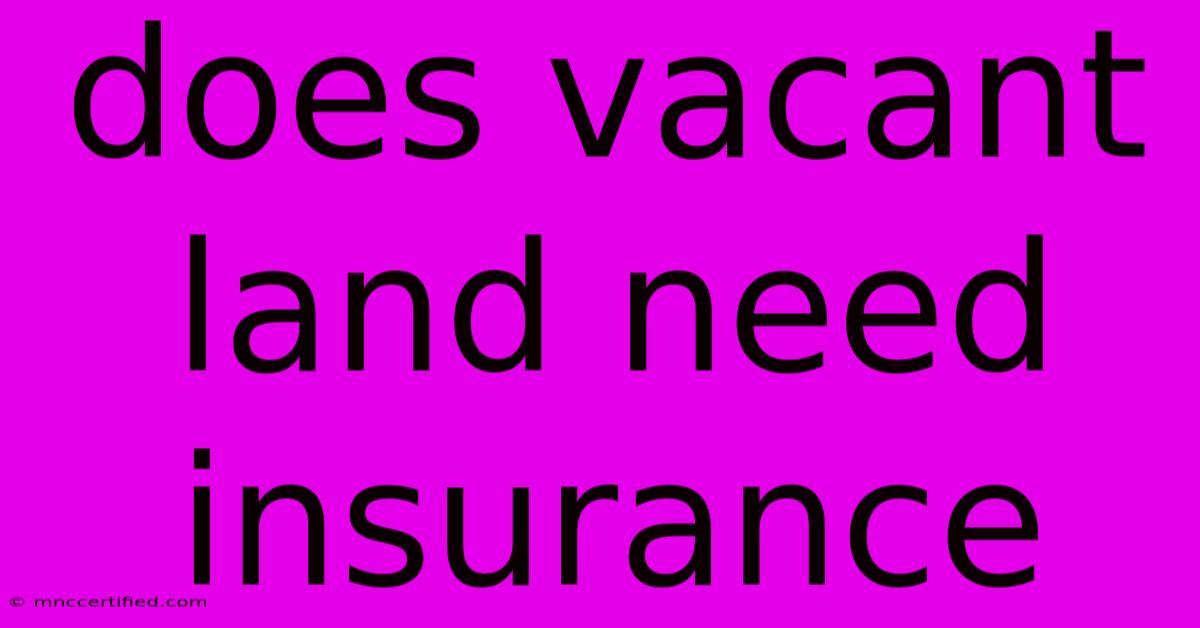Does Vacant Land Need Insurance

Table of Contents
Does Vacant Land Need Insurance? A Comprehensive Guide
Vacant land, while seemingly innocuous, presents unique risks that often leave owners wondering: does vacant land need insurance? The short answer is: it depends. While not mandatory in most jurisdictions, insuring vacant land offers crucial protection against various unforeseen circumstances. This comprehensive guide explores the necessity, benefits, and types of insurance suitable for your undeveloped property.
Why Insure Vacant Land? The Risks You Need to Consider
Many believe that because there's no structure on vacant land, there's no need for insurance. This is a misconception. Several potential liabilities and damages can significantly impact your investment:
1. Liability Risks: Protecting Yourself from Lawsuits
Even empty land poses liability risks. Think about these scenarios:
- Trespassing Accidents: Someone gets injured on your property – a broken ankle from a hidden ditch, a dog bite from a stray, etc. You could be held liable for their medical expenses and legal fees.
- Environmental Damage: Illegal dumping or pollution on your land could result in hefty cleanup costs and legal penalties.
- Fire: A wildfire spreading from neighboring properties or even a deliberately set fire could damage any vegetation and potentially spread to nearby developed areas.
Liability insurance covers these potential lawsuits, safeguarding your financial stability.
2. Property Damage: More Than Just Structures
While there's no building to insure, the land itself can experience damage:
- Erosion: Natural erosion can alter the landscape, diminishing its value.
- Vandalism: Graffiti, illegal dumping, or deliberate destruction can devalue your property.
- Acts of Nature: Flooding, wildfires, or storms can cause significant damage to the land, impacting its usability and value.
Types of Insurance for Vacant Land
Understanding the specific risks allows you to choose the appropriate insurance coverage:
1. Vacant Land Liability Insurance: The Essential Coverage
This is the most crucial type of insurance for vacant land. It protects you from financial repercussions due to injuries or damages occurring on your property, regardless of your negligence. This is highly recommended, even if you have other insurance policies.
2. Environmental Impairment Liability Insurance: Protecting Against Pollution
If your land has a history of environmental contamination or is located near potential sources of pollution, this coverage is vital. It safeguards you against the costs associated with cleanup and legal liabilities.
3. Title Insurance: Protecting Your Ownership
While not directly related to physical damage, title insurance ensures your ownership is clear and protects you against potential title defects or disputes that could challenge your claim to the land.
Factors Influencing Your Need for Insurance
Several factors influence the necessity of insuring your vacant land:
- Location: Properties in high-risk areas (prone to wildfires, floods, or vandalism) require more comprehensive coverage.
- Intended Use: If you plan to develop the land in the future, insurance protects your investment during the planning and development phases.
- Financial Resources: The cost of potential liabilities and damages can be substantial. Insurance provides financial protection and peace of mind.
- Mortgage Requirements: Some lenders may require insurance on vacant land, especially if it's used as collateral for a loan.
The Cost of Vacant Land Insurance
The cost varies based on factors such as location, land size, and the level of coverage. Obtaining quotes from multiple insurance providers is essential to secure the most competitive rates.
Conclusion: Weighing the Risks and Benefits
While not legally mandated, insuring vacant land is a wise investment that protects your financial interests against various risks. The potential costs associated with liability, property damage, and environmental issues can far outweigh the relatively modest cost of insurance. By understanding the types of available coverage and the specific risks associated with your property, you can make an informed decision that safeguards your investment and provides peace of mind. Don't underestimate the value of protecting your undeveloped land; it's an investment worth securing.

Thank you for visiting our website wich cover about Does Vacant Land Need Insurance. We hope the information provided has been useful to you. Feel free to contact us if you have any questions or need further assistance. See you next time and dont miss to bookmark.
Featured Posts
-
Hawkeyes Win Stevens Leads Rush
Nov 24, 2024
-
Macau Ufc Main Event And Card Results
Nov 24, 2024
-
Health Insurance Broker Orlando
Nov 24, 2024
-
Renters Insurance Scottsdale Az
Nov 24, 2024
-
Hamilton On Vegas Qualifying Should Have Been Pole
Nov 24, 2024